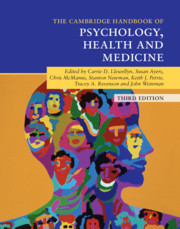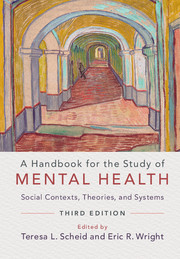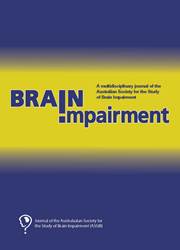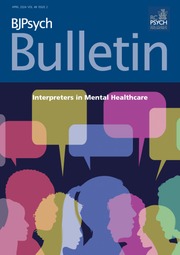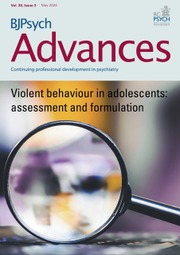The Cambridge Handbook of Stigma and Mental Health
£145.00
Part of Cambridge Handbooks in Psychology
- Editors:
- David L. Vogel, Iowa State University
- Nathaniel G. Wade, Iowa State University
- Date Published: August 2022
- availability: Available
- format: Hardback
- isbn: 9781108843904
£
145.00
Hardback
Other available formats:
Paperback, eBook
Looking for an inspection copy?
This title is not currently available on inspection
-
The persistence of stigma of mental illness and seeking therapy perpetuates suffering and keeps people from getting the help they need and deserve. This volume, analysing the most up-to-date research on this process and ways to intervene, is designed to give those who are working to overcome stigma a strong, research-based foundation for their work. Chapters address stigma reduction efforts at the individual, community, and national levels, and discuss what works and what doesn't. Others explore how holding different stigmatized identities compounds the burden of stigma and suggest ways to attend to these differences. Throughout, there is a focus on the current state of the research knowledge in the field, its applications, and recommendations for future research. The Handbook provides a compelling case for the benefits reaped from current research and intervention, and shows why continued work is needed.
Read more- The most detailed exploration of stigma and mental health to date
- Describes established and emerging interventions to reduce stigma
- Explores intersectional stigma and the way people with different identities experience its effects
Reviews & endorsements
'The Cambridge Handbook of Stigma and Mental Health provides an authoritative, up-to-date overview of stigma and mental health research written by leading researchers from around the world. It provides a classic and current overview of research as well as future directions.' Nursel Topkaya, Associate Professor, Ondokuz Mayis University, Turkey
See more reviews'This book will be an invaluable resource to students and researchers delving into the vast field of mental health stigma. Chapters on specific topics within the stigma field, such the measurement of stigma and discrimination, stigma among military personnel, and the relationship between stigma and masculinity, written by experts in those topics, will be extremely useful to many seeking information in those areas. I can't wait to have this resource available for my students and myself!' Philip Yanos, Professor and Director of Clinical Training, John Jay College of Criminal Justice, City University of New York, USA
'I have been involved in research on stigma, mental health, and help-seeking, and I am so glad to see that we will have the 'go-to' resource for researchers, students, teachers, and practitioners. This handbook provides the most updated collaborative research efforts in understanding the process of stigma, with great breadth and depth. It also offers ways to overcome stigma toward mental illness and seeking therapy.' Hsin-Ya Liao, Washington State University, USA
'This book would be an especially welcome addition to university libraries supporting programs in clinical psychology, but is also relevant for other fields of study, such as public policy and sociology. … Highly recommended.' G. Seror, III, Choice
Customer reviews
Not yet reviewed
Be the first to review
Review was not posted due to profanity
×Product details
- Date Published: August 2022
- format: Hardback
- isbn: 9781108843904
- length: 550 pages
- dimensions: 262 x 185 x 34 mm
- weight: 1.12kg
- availability: Available
Table of Contents
1. Introduction to the handbook of stigma and mental health David Vogel and Nathaniel Wade
2. Theoretical models to understand stigma of mental illness Lindsey Sheehan, Carlo Palermo and Patrick Corrigan
3. Disentangling mental illness and help seeking stigmas Rachel Brenner, Maddie Egli and Joseph Hammer
4. Measurement of mental illness stigma and discrimination Elaine Brohan, Maria Milenov, Ioannis Bakolis, Sara Evans-Lacko, Brandon Kohrt, and Graham Thornicroft
5. Time trends in public stigma Georg Schomerus and Matthias, Angermeyer
6. Consequences of the self-stigma of mental illness Jennifer Boyd, Manuel López, Clara González-Sanguino, J. Irene Harris and Isaiah Sampson
7. Self-stigma of seeking help: A meta-analysis Daniel Lannin and Jacqueline Bible
8. Stigma and suicide Philip Batterham, Alison Calear, and Ella Kurz
9. Intellectual disability stigma: The state of the evidence Shirli Werner and Katrina Scior
10. The intersection of mental health stigma and marginalized identities Courtney Andrysiak, Jennifer Cherry, Jessica Salmonsen and Lauren Mizock
11. Stigma and mental health in ethnic minority populations Lonnie Snowden, Genevieve Graaf, Latocia Keyes and Amanda Ryan
12. Mental health stigma amongst LGBTQ+ populations Carlos Vidales and Ashley MacBeth
13. Unpacking cultural influences on stigma of people with mental illness between group oriented and individual-oriented cultures Winnie Mak and Ben Yu
14. All the world's a stage: men, masculinity, and mental health stigma Stephen Wester
15. Understanding and reducing the stigma of mental health problems and of treatment among military personnel Thomas Britt and Zachary Klinefelter
16. Stigma of seeking mental health services and related constructs in older versus younger adults Corey Mackenzie, Nicole DelRosario and Melissa Krook
17. Stigma and mental health in the abrahamic religious traditions Lily Mathison, Russell Jackson and Nathaniel Wade
18. Interventions to reduce mental illness stigma and discrimination at the person-level for individuals and small groups Sarah Parry, Elaine Brohan, Petra Gronholm and Graham Thornicroft
19. Population-based interventions to reduce the stigma of mental illness Gaia Sampogna, Andrea Fiorillo, Lisa Giannelli and Claire Henderson
20. Interventions to reduce help-seeking stigma for mental health conditions Jane Hahn, Lina-Jolien Peter, Vanessa Juergensen, Georg Schomerus and Sara Evans-Lacko
21. Self-affirmation interventions Andrew Seidman
22. Mindfulness and self-compassion interventions to address mental health stigma Patrick Heath
23. What is left to be done: key points, future directions, and new innovations Nathaniel Wade and David Vogel.
Sorry, this resource is locked
Please register or sign in to request access. If you are having problems accessing these resources please email [email protected]
Register Sign in» Proceed
You are now leaving the Cambridge University Press website. Your eBook purchase and download will be completed by our partner www.ebooks.com. Please see the permission section of the www.ebooks.com catalogue page for details of the print & copy limits on our eBooks.
Continue ×Are you sure you want to delete your account?
This cannot be undone.
Thank you for your feedback which will help us improve our service.
If you requested a response, we will make sure to get back to you shortly.
×

